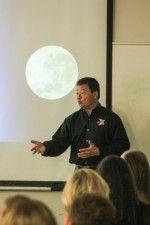THE BATTALION: What’s the hardest thing about living in space for a significant amount of time?
Chiao: The hardest part about living in space was probably just being away from your friends and family for that long. I also missed being around nature, I mean even though we are up there looking down at the rain forests and all the natural wonders of the world we are still in a very sterile lab environment, observing. I missed being on the Earth smelling grass and birds, seeing squirrels run around and things like that.
THE BATTALION: What was your first space walk like?
Chiao: It was really exciting to open the hatch and go out for the first time. In fact, the flight surgeon told me after that my heart rate had went up to about 130. You get outside and even though you have seen the Earth through the windows of the spacecraft, which is fantastic, when you actually go outside the view is that much better.
THE BATTALION: When you got back from your shuttle mission, what was the recovery process like from spending 6 and a half months in space?
Chiao: Even after a short duration shuttle mission, after you have been up for a week or two you come back and you are very dizzy, your brain has to learn how to re-assimilate those signals from your balance system. You feel kind of weak even though you may have been exercising you haven’t been using the exact muscles you use to walk and things like that. It takes you a couple of days to get back into it. You really have to force yourself to get up and walk around, even though it’s more comfortable to lay around because when you stand up you start getting dizzy and then that can be provocative, make you feel nauseous. But you have to force yourself to walk around until you get enough of your balance back that you can start exercising. Once you start exercising – running, walking, lifting some weights – then the recovery process really starts to accelerate. It took us about a week after the station flight to feel like we were back to normal, but we worked really hard at it. Some crews take two to three weeks and even longer.
THE BATTALION: What was your favorite food to eat while in space?
Chiao: It is funny, the Russians generally like the American food and the Americans like the Russian food. I think just because it’s different, it’s something new. One of my favorite things to eat was canned fish with tomato sauce in it.
THE BATTALION: Can you describe what zero gravity feels like?
Chiao: Here on Earth, the closest thing would be if you were completely relaxed in a swimming pool, it kind of feels like that. I mean the physics aren’t correct, but the impression, if you got a scuba mask on and you can see that’s kind of what its like.
THE BATTALION: What do you think the future holds for space and the United States?
Chiao: Fortunately, we are still continuing even though we ended the shuttle program two and a half years ago. We are still building the Orion spacecraft, which is the next generation spacecraft that is being designed to go beyond lower orbit. We are working on some new rocket systems, but I worry about the level of budgetary commitment from the administration. There is an interesting thing going on that kind of fits into all that and that is the commercial side. You have probably heard of some of these commercial companies such as Space X and Boeing Company that are receiving NASA’s assistance and capability to send astronauts to and from the International Space Station. That will take care of low Earth orbit. The idea is if NASA can help them develop that capability and contract with them for services, then NASA can take its resources and try to push farther and longer out there.
Stories from Space
March 24, 2014

Donate to The Battalion
Your donation will support the student journalists of Texas A&M University - College Station. Your contribution will allow us to purchase equipment and cover our annual website hosting costs.



















